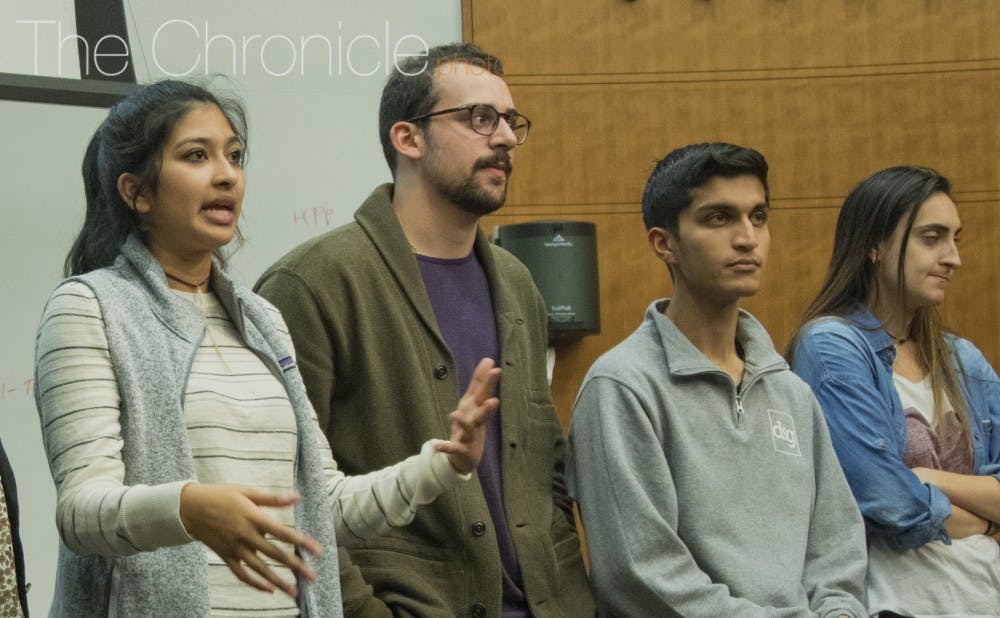Duke Student Government hopes to tackle student issues by creating coalitions of student leaders and administrators.
DSG started “steering committees” this year to bring together student leaders and administrators in discussing matters such as residential communities and intellectual engagement. Chief of Staff Kushal Kadakia, a sophomore, said that DSG’s Executive Board is aiming to engage directly with student groups about issues that impact the daily lives of students.
"One of the big things that [the Executive Board] talked about was the need to restore our position, or rather reaffirm our position, as a bridge between the needs of students and the resources of faculty,” Kadakia said. “Part of that is by institutionalizing and formalizing more meetings between different student groups and administrators."
The steering committees are rotating groups that meet each month for discussions. In October, the topic was “Construction and Communities,” which brought together student leaders of residential life with Larry Moneta, vice president of student affairs. In November, the group—which included the presidents of majors unions and organizations like Duke Conversations—talked about intellectual engagement with Steve Nowicki, dean and vice provost of undergraduate education.
Sophomore Caroline Wang, co-president of Duke Conversations, attended the November meeting on intellectual engagement and said she felt the meeting was productive. However, she added that although the meeting was well-organized, the discussion focused too much on the socioeconomic aspects of intellectual engagement, limiting the time spent on other related topics.
“An hour and a half is not enough time to cover all the problems that result in a lack of intellectual engagement on campus,” Wang said. “I just felt like that there was more that we could have talked about.”
Wang suggested that meetings on how to increase intellectual engagement should happen more regularly.
Senior Cassie Yuan—president of the Biology Majors Union, who also attended the meeting on intellectual engagement—noted that simply discussing the issue is not enough.
“We made progress,” Yuan said. “It's good to get some ideas flowing. But ultimately it's not about the meeting being productive or not, it's just about how much we can change about the system.”
Senior Sophie Jamal, president of the International Association, who attended the October meeting on residential communities, noted the meeting inspired real change in her group. She explained that because of the meeting, IA held a joint workshop with DSG, the Interfraternity Council and the Panhellenic Council to help first-year students from outside the U.S. learn about Greek organizations' recruitment processes.
“My overall thought was that it was a helpful discussion and that it has a lot of potential to turn into real programs if the people who attended the meeting are willing to take it one step further,” Jamal said.
Despite noting that she thought that the October meeting was productive, senior Angie Shen, who represented the Center for Multicultural Affairs, added that the gathering was not about administrators hearing feedback from students. She said that Moneta did not seem interested in student input.
“It was a very one–sided thing,” Shen said. “We would ask him questions, but the purpose of the meeting was not to get input from students. It was for us to get input from him.”
Wang and Yuan both said they felt the meetings were attended by a diverse group of people. Kadakia noted that achieving diversity in the meetings would always be a challenge, given the limits on committee size.
He added that he hopes to improve and expand the steering committee programs as part of a larger DSG goal to connect with Duke students.
"If I could sum it all up in terms of re-engagement, our goal is to do what DSG has always been doing, which is to serve and advocate on behalf of students,” Kadakia said. “I think a few of these initiatives just help us improve that and increase transparency and dialogue on really critical issues."
Get The Chronicle straight to your inbox
Signup for our weekly newsletter. Cancel at any time.
Class of 2019
Editor-in-chief 2017-18,
Local and national news department head 2016-17
Born in Hyderabad, India, Likhitha Butchireddygari moved to Baltimore at a young age. She is pursuing a Program II major entitled "Digital Democracy and Data" about the future of the American democracy.

